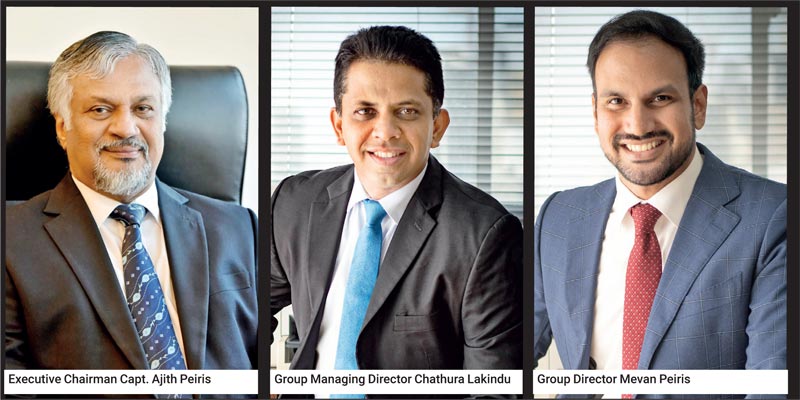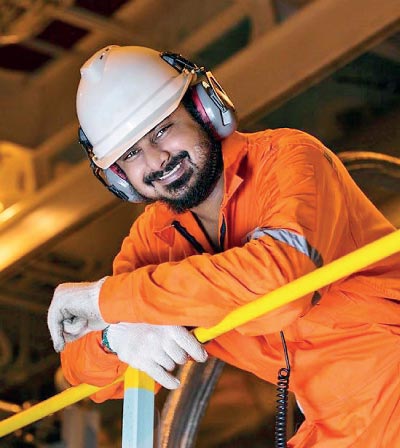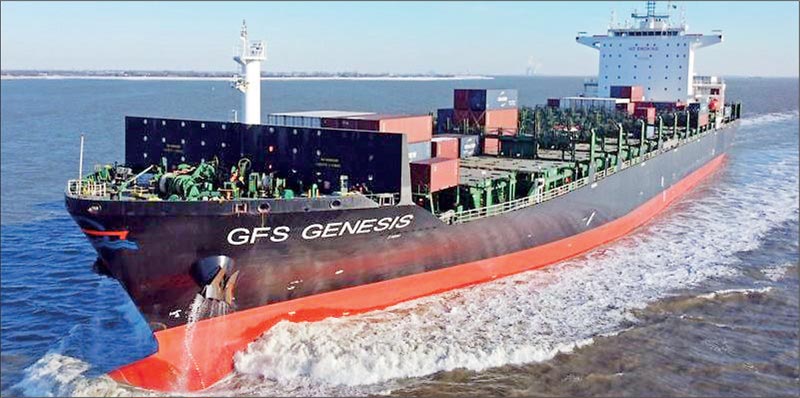Thursday Feb 26, 2026
Thursday Feb 26, 2026
Wednesday, 27 September 2023 09:47 - - {{hitsCtrl.values.hits}}

World Maritime Day, celebrated annually on the last Thursday of September, is a global event that shines a spotlight on the maritime industry’s vital role in the world economy while emphasising the importance of sustainable shipping practices. This year the day falls on 28 September as the world prepares to mark the role every single maritime officer, service agent, and seafarer plays in our own individual lives.
Often referred to as the linchpin of the world economy, the international shipping sector is responsible for transporting over 80% of global trade. The COVID-19 pandemic further underscored the dedication and professionalism of the 1.6 million seafarers who crew the world’s merchant vessels. Consequently, it’s accurate to describe that a secure and dependable maritime industry is actually the bedrock of the worldwide free-market system.
2023 Theme: ‘MARPOL at 50 – Our commitment goes on’
This year’s World Maritime Day theme is designated to be ‘MARPOL at 50 – Our commitment goes on’. MARPOL, short for ‘International Convention for the Prevention of Pollution from Ships,’ is one of the most important international treaties governing maritime pollution. Accordingly global establishments including the International Maritime Organization are gearing up to mark global environmental performance; reducing plastic litter from ships; supporting innovation in marine fuel production; decarbonising the maritime sector; unlocking green finance; and partnerships and collaboration. With the celebratory day approaching, leading maritime group of Sri Lanka, Ceyline Group of Companies is seeking to highlight the significance of the marine industry in Sri Lanka and their indispensable contribution to the upliftment of the country.Ceyline Group and CINEC Campus Executive Chairman Capt. Ajith Peiris recently sat down with Daily FT to discuss the paramount role of the marine industry here in Sri Lanka and how Ceyline Group seeks to revolutionise it. Following are excerpts of the discussion:
 By Nuzla Rizkiya
By Nuzla Rizkiya
Q: Give us a brief overview of the Ceyline Group of Companies.
Ceyline Group of Companies is one of the leading ‘diversified’ maritime groups in Sri Lanka established in 1986 with the bold vision of providing value-added shipping and management services to all Sri Lankan and international maritime clients.
Established in 1986, during a time of political instability and civil unrest due to terrorism, Ceyline Group chose to stand our ground and contribute to the nation’s economy in every way possible.
Beginning with very humble roots, a four-member, one portfolio operation, Ceyline Group grew its operations over the years, to a group of companies with 25 subsidiaries. Today the company provides land-based employment to about one thousand people and sea-based employment to about five thousand.
Striving to offer an array of comprehensive, cost efficient and result-driven services, we are now also branded as the No. 1 company in terms of crew management/seafarer recruitment and maritime education and training which I believe is due to our priorities in bringing forth employment and foreign exchange into the country.
Q: Since your establishment in 1986, is it correct to say that Ceyline Group has pioneered the maritime industry in Sri Lanka for over three decades? How has your journey been so far?
I would mention that a key factor which has helped us grow over the years is our effort to lead by example. We strive to be focused on the work we do and do it well, without being distracted by the external challenges and circumstances. This factor roots to our years of initial establishment. One of primary objectives is to contribute to the Sri Lankan economy by creating foreign exchange. Another is to create employment and improve the lives of our people.
I would say one of our biggest milestones in our journey is establishing CINEC Campus in 1990, which is now the largest private institute for marine education in Sri Lanka. The college helps build the capacity and empower thousands of youth by providing knowledge and skills necessary for a career in the global marine industry.
We are also known to be the largest ship’s crew recruitment company in Sri Lanka and is also ranked amongst the “top three” conglomerates in almost all segments we operate in, including marine engineering services, ship supplies, feeder shipping services, container transportation, container depot operations, reefer container management, healthcare laboratory network, seafarer travel services, etc.
Q: Let us talk about the global marine industry. Where is it heading? How do you view the potential Sri Lanka has, for it to thrive in the avenue? What are trends we can anticipate or should be prepared with?
A: In terms of the global trends and the demands, the maritime industry is rapidly transforming to a digitalised and technologically driven industry. Countries around the world have already introduced and adapted online platforms for their exports, imports and logistical to create efficiency in their trade. The demand is always higher towards individuals proficient in their digital capabilities.
Ceyline Group is always on the lookout for the latest developments and is keen to align, introduce and adapt to the successful and proven advancements in the field be it technological or occupational.
Talking about Sri Lanka, our country is already a very popular tourist destination and famed for our hospitality. However, migrant worker remittance has become one of the key source of foreign exchange earnings for Sri Lanka. This has inadvertently resulted in workers, especially women sometimes being forced into taking up unskilled labour jobs in foreign countries. So children growing up without the care and nurturing of their mothers, hard earned money by these women being mishandled by menfolk are frequent social problems we see in the country.
Therefore more awareness among people and more involvement especially about the marine industry by authorities and individuals would definitely help change the course of these trends.
Q: Talking about life in sea, how would you describe the assurance provided for a career path for an individual hoping to join the marine industry? I am sure it has many risks compared to its rewards.
I myself joined this industry when I was 18 years, gradually climbing the career ladder to become ship captain and then becoming what I am today, the Executive Chairman of Ceyline Group and CINEC Campus. I personally assure and endorse this field as it brings both professional recognition and a solid income.
In terms of income, a qualified seafarer is capable of earning a minimum tax-free monthly ‘start-up’ wage of $ 1,000 which in today’s currency rate will amount to almost Rs. 350,000. In the category of officers, an officer who holds the certificate of competency is subjected to a minimum wage amounting to $ 2,000.
Talking about the risks of the career, it does have its demands similar to many other fields. In a career at the sea requires adjusting to working in confined spaces, adapting to a life at sea i.e. to be safety conscious 24/7 and having to stay away from your home for a long period. Adapting to foreign work environments and mingling with many foreign nationals are some other critically required skills. But if we consider it overall, I would say the count of benefits for an individual involved in a shipping career is way higher when compared to its demands.
Q: What is Ceyline Group’s strategy for sustained growth? How does it plan to revolutionise the maritime industry in Sri Lanka?
We have now estimated the number of active seafarers of Sri Lanka employed in foreign ships to be 16,000 and their remittance brought in to be $ 500 million per annum. The global marine industry records almost 1.6 million employees. Therefore Sri Lanka accounts only for almost 1% of the crowd.
A few years ago, Ceyline Group proposed a project (which was approved by the GOSL) to amplify the number of seafarers to 50,000 in a period of five years. This target brings approximately a remittance amount of $ 1.5 billion per annum. Additionally, the reimbursement and employment covers provided by foreign ship owning companies will help increase the remittance amount to $ 2 billion per annum. This strategy can be utilised as a key source of foreign exchange earnings without investment for the country. Our team is continuously dedicated to work towards promoting and marketing maritime training and education and employment on ships.
Adding to this we as a group of companies are aspiring to make Ceyline a global brand. By taking our years of expertise and experience in the industry beyond our borders. We intend on establishing our presence overseas to market Sri Lanka and convince the world to direct business to our country, thereby making it a true maritime hub in the region.

